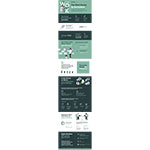ServiceNow Unveils “The Work Survey,” A Comprehensive Global View of COVID-19’s Impact on Work and the Opportunities Ahead for Business and Workforce Innovation

- The Work Survey captures insights from executives and employees in 11 countries across multiple industries
- A new pace, the perfect environment for innovation: executives and employees agree that technology enabled their companies to pivot to new ways of working faster than anyone believed possible, accelerating digital transformation
- Rethinking work: executives and employees voice different opinions on the best path forward, but agree on the opportunity to rethink how work happens
SANTA CLARA, Calif.–(BUSINESS WIRE)–ServiceNow (NYSE: NOW), the leading digital workflow company that makes work, work better for people, today released The Work Survey, one of the most comprehensive global surveys to date on COVID-19’s impact on work and the opportunities ahead for a wave of digital innovation in how people work and businesses operate.
Executives and employees surveyed in 11 countries across multiple industries agree: technology enabled them to pivot to new ways working faster than thought possible, and digital transformation will accelerate innovation.
“The world’s dramatic pivot to working digitally is showing everyone what the future of work looks like,” said ServiceNow CEO Bill McDermott. “Digital workflows are the way business gets done in the 21st century. There’s no going back. Digital transformation will accelerate. New ways of working will become the norm. We are on the cusp of an unprecedented wave of workflow and workplace innovation.”
Fielded in September by Wakefield Research on behalf of ServiceNow, The Work Survey engaged 9,000 executives and employees across multiple industries, including financial services, healthcare, telecommunications, manufacturing, and the public sector, in the United States, United Kingdom, France, Germany, Ireland, Netherlands, India, Japan, Singapore, Australia, and New Zealand.
Key findings include:
- 92% of executives say the pandemic made their company rethink how they work; 87% of employees say it’s an improvement.
- 91% of executives and 87% of employees say their company transitioned to new ways of working faster than they thought possible.
- COVID-19 has reduced operating expenses for 88% of businesses surveyed, creating opportunities for investments in digital transformation, research and development, marketing, and growth.
Businesses have innovated rapidly but will need to step up to continue the pace
At least half of executives and employees think transitioning to the new normal will be even more challenging than the initial shock of COVID-19 (50% executives and 53% employees). This challenge is exacerbated because most businesses are at a digital disadvantage, with 91% of executives admitting they still have offline workflows, including document approvals, security incident reports, and technology support requests. Progress has been made, but months into working from home, 60% of executives and 59% of employees say their companies still do not have a fully integrated system to manage digital workflows.
Despite adapting to COVID-19, confidence is low that companies could rapidly transform again
New systems put in place as a result of COVID-19, which employees (87%) say created new and better ways of working, were developed on the fly and are vulnerable to the next major disruption. Most executives and employees say their key business functions would not be able to adapt within 30 days in the event of another disruption. The only department that captured a majority of confidence for executives and employees was IT, with 61% of executives and 66% of employees thinking IT could adapt within a month. Customer service, HR, finance, and sales and marketing didn’t make the cut, revealing more opportunities for innovation across the enterprise.
You’re only as good as your people: winning today means embracing distributed work better and faster than the competition
While the benefits of remote work are universally touted (99% executives, 94% employees), months into working from home, the challenges are becoming more apparent. Both executives (93%) and employees (83%) express real concerns about how remote work will impact the business moving forward. The biggest concerns and benefits with continued remote work depends on where you sit.
- Executives are most worried about outputs—delays in product or service delivery (54%), while their employees are most concerned about the inputs—reduced collaboration between business units (48%).
- Employees say that time saved from not commuting or traveling (54%) has benefited them most, while executives believe that better use of technology to improve efficiency (50%) is the greatest benefit to their teams.
Personal safety is paramount: resuming in-person work hinges on whether employees feel safe
60% of employees believe their company will prioritize business continuity over workplace safety. More surprising is the fact that 44% of executives actually believe this as well. Even if a company makes an effort to put safety first, employees don’t think they can pull it off. 46% of employees do not believe their company will take the necessary steps to ensure their safety. Surprisingly, executives agree. Nearly a third of executives (32%) admit they don’t think their company will take the appropriate steps for safety.
COVID-19 has changed corporate spending: companies will prioritize digital transformation investments
COVID-19 has reduced operational expenses for 88% of businesses, freeing up resources for innovation, resilience, recovery, and growth. Gone is business travel, in-person events, and other operating expenses. Executives and employees both agree that those cost savings should be redirected into digital transformation (57% of executives; 44% of employees) – beating out new business (45% of executives; 36% of employees); R&D (43% of executives; 35% of employees); and marketing and advertising (42% of executives; 30% of employees) to top their wish lists.
More information about The Work Survey can be found by accessing the survey findings slide deck and infographic.
Survey Methodology
Wakefield Research fielded an online quantitative survey between September 1st and September 10th, 2020 to 900 C-level executives and 8,100 office professionals (employees) from companies of 500 or more employees in the following countries: United States, United Kingdom, France, Germany, Ireland, Netherlands, India, Japan, Singapore, Australia, and New Zealand. While Wakefield surveyed across industries, the findings highlight meaningful differences from employees in the following five key industries: financial services, healthcare, manufacturing, telecommunications, and public sector.
About ServiceNow
ServiceNow (NYSE: NOW) is making the world of work, work better for people. Our cloud‑based platform and solutions deliver digital workflows that create great experiences and unlock productivity for employees and the enterprise. For more information, visit: www.servicenow.com.
© 2020 ServiceNow, Inc. All rights reserved. ServiceNow, the ServiceNow logo, Now, and other ServiceNow marks are trademarks and/or registered trademarks of ServiceNow, Inc. in the United States and/or other countries. Other company names, product names, and logos may be trademarks of the respective companies with which they are associated.
Contacts
ServiceNow PR
Penny Bruce
(408) 893-0601
penelope.bruce@servicenow.com

